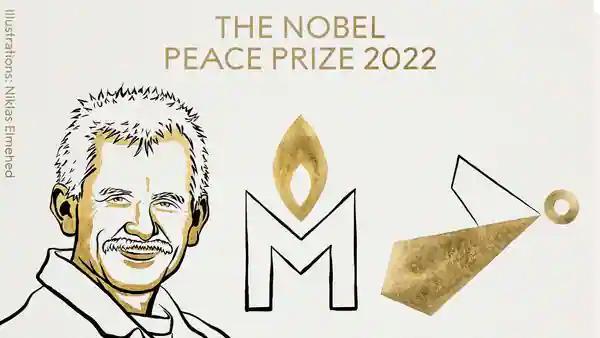This year’s Nobel Peace Prize has been awarded to the Ukrainian human rights organization Center for Civil Liberties, Belarusian human rights activist Ales Bialiatski, and Russia’s Memorial HRC.
The Ukrainian Center for Civil Liberties is engaged in promoting human rights and democracy in the country, assistance programs for «Kremlin prisoners» — Ukrainian political detainees held in Russian jails, investigation of war crimes, tracing missing citizens, and providing assistance to thousands of Ukrainians affected by the war unleashed by the Putin regime.
Ales Bialiatski was one of the initiators of the democratic movement that emerged in Belarus in the mid-1980s. He devoted his entire life to the promotion of democracy and peace in his country. The Human Rights Center » Viasna,» which he founded in 1996, collected information about those detained at the protests and torture in detention centers, provided help to the victims of law enforcement excesses.
Memorial, Russia’s most important human rights organization, was founded in 1987 by a group of likeminded activists who wanted to commemorate the victims of Soviet-era political repression. Members of the movement created a complex of sites dedicated to the victims of repression, and held demonstrations, exhibitions, and seminars on the subject of state terror. The first chairman of Memorial’s board was Andrei Sakharov, a Nobel Peace Prize laureate.
In announcing the winners, Berit Reiss-Andersen, chair of the Norwegian Nobel Committee, stated that «the Peace Prize laureates represent civil society in their home countries. They have for many years promoted the right to criticise power and protect the fundamental rights of citizens. They have made an outstanding effort to document war crimes, human right abuses and the abuse of power.»
Natalia Arno, president of Free Russia Foundation, in congratulating her fellow human rights activists on their award, noted that the protection of civil liberties should be the space that can still unite the citizens of post-Soviet countries, dragged by the will of one man into the most grievous of conflicts.
«I welcome the decision of the Nobel Committee and salute all the laureates for the recognition of their merits. The award goes to people who embody not only the struggle for truth and justice, but also the very fundamental notion of freedom. It is also an indication of the plight of civil society in our countries, divided by the will of one man and now separated by history for decades to come. Just look at where we are today: the Ukrainian Center for Civil Liberties, headed by Oleksandra Matviychuk, has been investigating the thousands of war crimes committed by Putin’s army on Ukrainian soil since February; Viasna, Belarus’ leading human rights organization, has been demolished, with Ales Bialiatski and many of its staff arrested; Memorial has been fined and liquidated, its assets have been seized by the authorities, and its team has been forced to flee the country. But I believe that we will not allow this regime to finally destroy our lives and the historical destinies of our peoples. Protecting basic human rights is still the space that unites us in 2022. I congratulate you, colleagues! Peace, freedom, and justice to our countries!»


